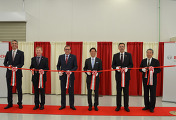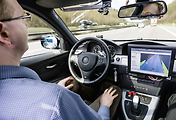From Europe to North America and China, gasoline direct injection is set to become a standard feature in key auto markets. This trend is primarily being driven by more stringent emissions standards. More and more countries around the world are introducing legislation to reduce CO2 emissions standards for new vehicles. Automakers are therefore turning to more efficient powertrain concepts, in particular compact, downsized engines featuring Bosch turbocharging and gasoline direct injection, such as the 1.0-liter EcoBoost engine from Ford and the 1.4-liter Turbo FSI engine from the Volkswagen Group. And there's plenty more to come: by 2016, half of all new vehicles in Europe alone will be equipped with gasoline direct injection.
Online Dossier
Gasoline direct injection
“Business with gasoline direct injection technology is growing strongly,” says Dr. Rolf Bulander, the member of the board of management at Robert Bosch GmbH responsible for powertrain technology. In 2012 Bosch supplied more than five million systems, and this figure is set to rise to nine million by 2015. That means Bosch is already the market leader in this segment. In fact, Robert Bosch GmbH has achieved an even higher market share for gasoline direct injection systems than its already impressive figures for classic port fuel injection systems. At the same time Bosch is enjoying comfortable double-digit growth across global markets with its gasoline direct injection technology.
“In a few years’ time, America and China will also be joining in”
Europe is both the cradle of this technology and its leading market. In 2013, some 40 percent of all new cars in Europe were equipped with gasoline direct injection technology. By 2020, Bosch expects to have a market share of up to 60 percent in the region. “At the moment our gasoline direct injection business is booming in Europe. But in a few years’ time a lot of the action will also be taking place in America and China,” says Bulander. Over the next few years the U.S. market for gasoline direct injection will skyrocket, largely because well over 90 percent of all vehicles in that region are powered by gasoline engines. At the same time the U.S. government has set stringent standards that automakers will be required to meet by 2025.
Legislators in China are exerting similar pressure. The percentage of gasoline engines in the passenger car segment is well over 90 percent there, too. In addition, the market will gain even more momentum from the middle of this decade onward thanks to China's burgeoning middle classes. Bosch therefore predicts that one-third of newly-registered vehicles in China will be equipped with gasoline direct injection technology by 2020.
To keep pace with this growth in all three regions, Bosch has European manufacturing sites in Bamberg and Nuremberg (Germany) and Bursa (Turkey), and also manufactures components for direct injection in Charleston (U.S.), San Luis Potosi (Mexico), Wuxi (China), and Gunpo (Korea).
Automotive Technology is the largest Bosch Group business sector. According to preliminary figures, its 2013 sales came to 30.7 billion euros, or 66 percent of total group sales. This makes the Bosch Group one of the leading automotive suppliers (note: due to a change in the legal rules governing consolidation, the 2013 figures can only be compared to a limited extent with the 2012 figures). Automotive Technology largely operates in the following areas: injection technology for internal-combustion engines, alternative powertrain concepts, efficient and networked powertrain peripherals, systems for active and passive driving safety, assistance and comfort functions, technology for user-friendly infotainment as well as car-to-car and Car2X communication, and concepts, technology, and service for the automotive aftermarket. Bosch has been responsible for important automotive innovations, such as electronic engine management, the ESP® anti-skid system, and common-rail diesel technology. |
PI8513 - April 07, 2014
/ Photo & Report provided by Bosch Press Release - sujung.jang@kr.bosch.com
/ MediaPaper.KR mediapaper@ymail.com Sejin Oh
/ The News Article was written by receiving a Press Release.
'Car > BOSCH' 카테고리의 다른 글
| 100 Years of Vehicle Horns and Fanfare from Bosch (0) | 2014.04.21 |
|---|---|
| Bosch “APAS assistant”: a flexible, mobile automation solution for connected production (0) | 2014.04.07 |
| New site for Bosch Packaging Technology (0) | 2014.04.04 |
| Bosch putting the autopilot on the road (0) | 2014.03.31 |
| 100 years of Bosch starter motors (0) | 2014.03.17 |



 Click here to find further information
Click here to find further information



댓글